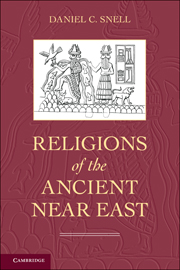Book contents
- Frontmatter
- Contents
- Figures and Maps
- Preface
- Acknowledgments
- 1 Defining Time and Space
- 2 Early Inklings
- 3 Gods, Gods, Gods
- 4 Cities, States, and Gods
- 5 The Lure of Egypt, 4000–1400 BCE
- 6 The Gods of Egypt
- 7 The Akhenaten Dream, 1350–1300 BCE
- 8 Practice in Egypt
- 9 The International Age, 1400–1000 BCE
- 10 Gods and People
- 11 The Lord Is One – Israel in Its Environment
- 12 The Turning
- 13 The Good God and the Bad God
- 14 The Lands of Baal
- 15 Greece, Etruria, Rome, and Conveying Traditions
- 16 The Dead Hand of the Past and the Living God
- 17 Experiencing Ancient Near Eastern Religion
- References
- Index
15 - Greece, Etruria, Rome, and Conveying Traditions
Published online by Cambridge University Press: 05 June 2012
- Frontmatter
- Contents
- Figures and Maps
- Preface
- Acknowledgments
- 1 Defining Time and Space
- 2 Early Inklings
- 3 Gods, Gods, Gods
- 4 Cities, States, and Gods
- 5 The Lure of Egypt, 4000–1400 BCE
- 6 The Gods of Egypt
- 7 The Akhenaten Dream, 1350–1300 BCE
- 8 Practice in Egypt
- 9 The International Age, 1400–1000 BCE
- 10 Gods and People
- 11 The Lord Is One – Israel in Its Environment
- 12 The Turning
- 13 The Good God and the Bad God
- 14 The Lands of Baal
- 15 Greece, Etruria, Rome, and Conveying Traditions
- 16 The Dead Hand of the Past and the Living God
- 17 Experiencing Ancient Near Eastern Religion
- References
- Index
Summary
Religion was among [Napoleon's] favorite topics. It was his vague religiosity, perhaps a lingering attachment to childhood beliefs, which made him recoil from the cold materialism of Berthollet and attracted him to the more open-minded Monge. Also, religion had such obvious political usefulness!
– J. Christopher Herold, Bonaparte in Egypt, 1962, 53They spoke in a pidgin language, so nuances were not ascertainable, but the guys kneeling on the Italian shore were captivated by what the foreigners were doing. They had bought, among other things, a sheep, and they were clearly intending to cook it, eat it, and share it with their trading partners in celebration of this so far successful voyage. The foreigners’ wooden ship was skillfully anchored to a big rock onshore, and the wine they had bought they also shared generously.
They slaughtered the sheep near the fire, but then one of them cut a gash in the sheep's belly and thrust his hand in, drawing out the liver, which he then closely studied. The Italians asked him what he was doing, and he seemed to say that he was seeking there the will of the gods. The Italians looked at each other as if he were daft, but they were silent and tried to be respectful.
- Type
- Chapter
- Information
- Religions of the Ancient Near East , pp. 139 - 147Publisher: Cambridge University PressPrint publication year: 2010

